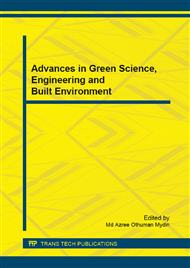[1]
E. -L Sundblad, Biel, a., & Gärling, T. (2014).
Google Scholar
[2]
Science, S. (2011). International Master s Programme in Environmental Is low carbon tourism a good incentive for the development of a low carbon community , - A case study of the Pinglin District Ying-Chen Fang, 46(0).
Google Scholar
[3]
Bin, S., Dowlatabadi, H., 2005. Consumer lifestyle approach to US energy use and the related CO2 emissions. Energy Policy 33, 197–208.
DOI: 10.1016/s0301-4215(03)00210-6
Google Scholar
[4]
Schipper, L., Bartlett, S., Hawk, D., Vine, E., 1989. Linking life-styles and energy use: a matter of time? Annual Review of Energy 14, 273–320.
DOI: 10.1146/annurev.eg.14.110189.001421
Google Scholar
[5]
Abdul-Wahab, S.A., 2010. Level of environmental awareness towards depletion of the ozone layer among distributors and consumers in the solvent sector: a case study from Oman. Climatic Change 103, 503–517.
DOI: 10.1007/s10584-009-9777-x
Google Scholar
[6]
Rokeach, M., 1973. The Nature of Human Value. New York, Free Press.
Google Scholar
[7]
Olson, J.M., Zanna, M.P., 1993. Attitudes and attitude change. Annual Review of Psychology 44, 117–154.
DOI: 10.1146/annurev.ps.44.020193.001001
Google Scholar
[8]
Barr, S., Gilg, A.W., Ford, N., 2005. The household energy gap: examining the divide between habitual-and purchase-related conservation behaviours. Energy Policy 33, 1425–1444.
DOI: 10.1016/j.enpol.2003.12.016
Google Scholar
[9]
Gadenne, D., Sharma, B., Kerr, D., Smith, T., 2011. The influence of consumers' environmental beliefs and attitudes on energy saving behaviours. Energy Policy. (21), 7684–7694.
DOI: 10.1016/j.enpol.2011.09.002
Google Scholar
[10]
Karp, D.G., 1996. Values and their effect on pro-environmental behavior. Environ- ment and Behavior 28, 111–133.
Google Scholar
[11]
Clark, C.F., Kotchen, M.J., Moore, M.R., 2003. Internal and external influences on pro-environmental behavior: participation in a green electricity program. Journal of Environmental Psychology 23, 237–246.
DOI: 10.1016/s0272-4944(02)00105-6
Google Scholar
[12]
Kaplowitz, M.D., Thorp, L., Coleman, K., Kwame Yeboah, F., 2012. Energy conserva- tion attitudes, knowledge, and behaviors in science laboratories. Energy Policy. 50, 581–591.
DOI: 10.1016/j.enpol.2012.07.060
Google Scholar
[13]
Van Raaij, W.F., Verhallen, T.M.M., 1983. A behavioral model of residential energy use. Journal of Economic Psychology 3, 39–63.
DOI: 10.1016/0167-4870(83)90057-0
Google Scholar
[14]
Young, W., Hwang, K., McDonald, S., Oates, C.J., 2010. Sustainable consumption: green consumer behaviour when purchasing products. Sustainable Develop- ment 18 (1), 20–31.
DOI: 10.1002/sd.394
Google Scholar
[15]
Niemeyer, S., 2010. Consumer voices: adoption of residential energy-efficient practices. International Journal of Consumer Studies 34 (2), 140–145.
DOI: 10.1111/j.1470-6431.2009.00841.x
Google Scholar
[16]
Stern, P.C., 2000. Toward a coherent theory of significant environmental behaviour. Journal of Social Issues 56 (3), 407–424.
Google Scholar


